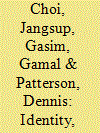| Srl | Item |
| 1 |
ID:
109078


|
|
|
|
|
| Publication |
2011.
|
| Summary/Abstract |
While work on the political behaviour of religious groups in America has shown that, among other things, religious commitment and strong opinions on salient issues can encourage turnout and raise the probability of these groups' members voting in national elections, much less is known about these relationships with respect to Muslim Americans. Using data collected at mosques in 2006 during the holy month of Ramadan, this article maps the turnout patterns of Muslim American respondents and then investigates the factors that explain the political participation of members of this increasingly important religious group. The article focuses on reported turnout in the 2004 presidential election and shows that, more than anything else, strong opinions on salient issues boosted the participation rates of members of this religious group in the election, even when controlling for other factors known to help explain turnout.
|
|
|
|
|
|
|
|
|
|
|
|
|
|
|
|
| 2 |
ID:
161477


|
|
|
|
|
| Summary/Abstract |
Most empirical studies report that religious people are less likely to be tolerant in social or political life. This study, however, claims that rather than religiosity per se, adherence to a textualist-traditionalist understanding of Islam, which is based on a literal reading of the sacred texts and a heavy reliance on the tradition, and which generates timeless and absolute standards of good and bad conduct, leads to social intolerance towards members of out-groups. Religious commitment exacerbates intolerance in the case of textualist-traditionalist believers, but not necessarily in the case of non-textualists. These arguments are tested on a sample of the Sunni population from Turkey by using the July 2012 data-set of the KONDA Barometer series. The analysis points to two different mind-sets generating distinct tolerance attitudes.
|
|
|
|
|
|
|
|
|
|
|
|
|
|
|
|